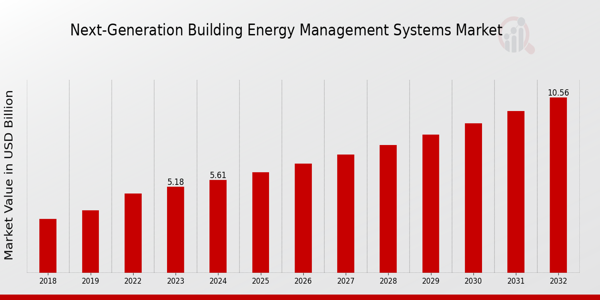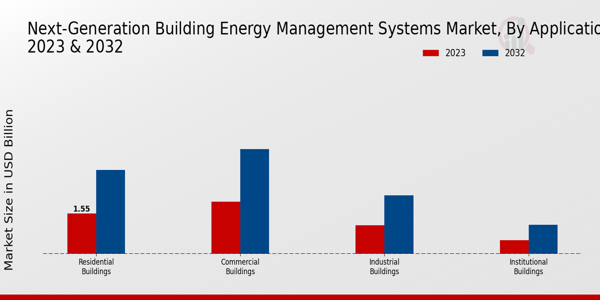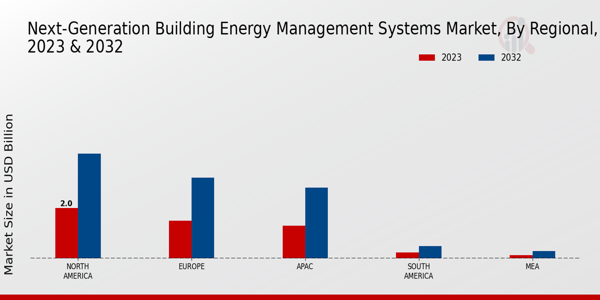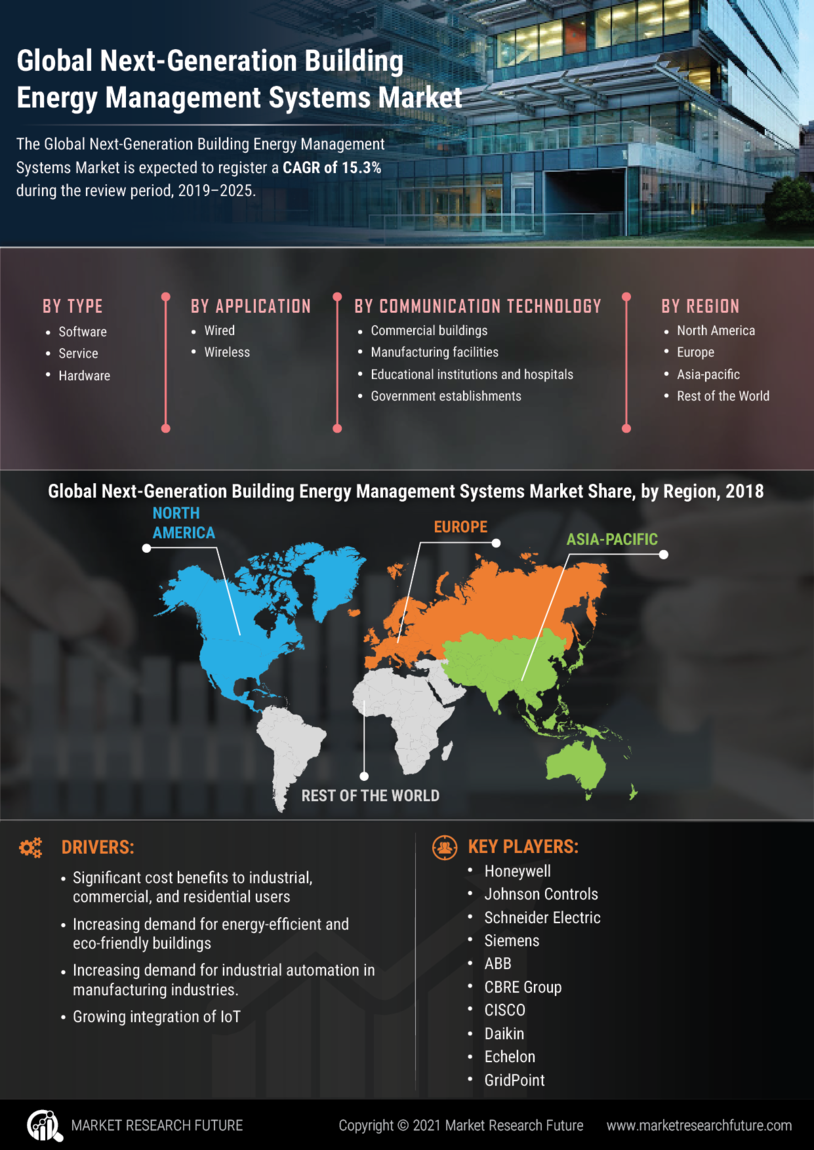Next-Generation Building Energy Management Systems Market Overview
As per MRFR analysis, the Next-Generation Building Energy Management Systems Market Size was estimated at 4.79 (USD Billion) in 2022.
The Next-Generation Building Energy Management Systems Market Industry is expected to grow from 5.18 (USD Billion) in 2023 to 10.55 (USD Billion) by 2032. The Next-Generation Building Energy Management Systems Market CAGR (growth rate) is expected to be around 8.22% during the forecast period (2024 - 2032).
Key Next-Generation Building Energy Management Systems Market Trends Highlighted
The Global Next-Generation Building Energy Management Systems Market is experiencing notable growth driven by various factors. Increasing global awareness regarding energy conservation and sustainability is prompting organizations to adopt innovative solutions that enhance energy efficiency. Technological advancements such as the incorporation of IoT, AI, and machine learning play a significant role in revolutionizing building management practices. Additionally, regulations and standards promoting energy efficiency are pushing companies to adopt these systems. Organizations are also focusing on reducing operational costs, which further accelerates market demand. There are great prospects in this market that are worth pursuing in regard to promoting sustainability initiatives.
Businesses can enhance their products by embedding predictive analytics and maintenance capabilities into their energy management systems. As more companies express sustainability objectives, there is room for new products that integrate energy management with alternative energy sources. Transitioning to smart buildings not only increases energy efficiency but also improves user experience. Joint ventures of technology providers with facility managers can create new opportunities for development as custom-made products gain more importance.
Trends in recent times point toward the growing importance of data-driven decision-making in energy management. The adoption of cloud-based solutions facilitates real-time monitoring and control, allowing businesses to optimize energy usage dynamically. There is also a rising focus on user-friendly interfaces and dashboards that make it easier for facility managers to interpret data and act on insights. Moreover, sustainability initiatives are being prioritized, pushing the market toward more eco-friendly solutions. With the rising demand for resiliency and adaptability, next-generation systems are transforming how buildings interact with energy sources, paving the way for a sustainable future.
Fig 1: Next-Generation Building Energy Management Systems Market Overview

Source: Primary Research, Secondary Research, Market Research Future Database and Analyst Review
Next-Generation Building Energy Management Systems Market Drivers
Increasing Demand for Energy Efficiency
The Global Next-Generation Building Energy Management Systems Market Industry is witnessing a significant push towards energy efficiency. As energy costs continue to escalate, businesses are driven to optimize their energy consumption to manage costs effectively. This trend is further fueled by the growing awareness of the ecological impact of energy usage, prompting businesses and organizations to adopt advanced technologies that enable them to monitor and reduce their energy consumption. Next-generation building energy management systems offer sophisticated analytics and real-time data monitoring capabilities, allowing facility managers to identify inefficiencies and implement corrective measures swiftly.
With governments around the world also putting pressure on businesses to adhere to stringent energy regulations and sustainability goals, the demand for energy-efficient systems is expected to rise. Consequently, this shift not only addresses rising operational costs but also aligns with global efforts towards sustainability and carbon footprint reduction, driving the growth of the Global Next-Generation Building Energy Management Systems Market.
Technological Advances in IoT and AI
Technological advancements in the fields of the Internet of Things (IoT) and Artificial Intelligence (AI) have played a pivotal role in the evolution of the Global Next-Generation Building Energy Management Systems Market Industry. The integration of IoT devices allows for seamless connection and communication between various building systems, enhancing data collection and analysis capabilities. AI algorithms can optimize energy usage by analyzing patterns and predicting energy needs in real-time, leading to more effective management strategies. These technological innovations not only provide significant cost savings but also enable predictive maintenance, further driving market growth.
As investment in smart building technologies rises, the market is positioned for continued expansion.
Government Initiatives and Incentives for Sustainable Building
Government initiatives and incentives aimed at promoting sustainable building practices significantly influence the Global Next-Generation Building Energy Management Systems Market Industry. Many countries are implementing regulations that encourage or mandate the adoption of energy management systems to comply with environmental standards and achieve energy efficiency goals. These initiatives might involve tax incentives, financial grants, or funding for technology upgrades, making it more financially feasible for organizations to invest in next-generation energy management systems.
As more governments look to combat climate change and reduce dependency on fossil fuels, the pressure to adopt energy-efficient technologies will continue to grow, fostering a more favorable environment for the market.
Next-Generation Building Energy Management Systems Market Segment Insights
Next-Generation Building Energy Management Systems Market Application Insights
The Global Next-Generation Building Energy Management Systems Market is expected to show robust growth across various applications, catering to different types of buildings. In 2023, the total market was valued at 5.18 USD Billion, reflecting the increasing importance of energy management in modern construction. Notably, the Residential Buildings segment holds a significant portion of the market, valued at 1.55 USD Billion in 2023 and projected to grow to 3.2 USD Billion by 2032. This segment is crucial as it increasingly adopts smart technologies and energy-efficient solutions to reduce utility costs and enhance comfort.
Following closely, the Commercial Buildings segment has a current market valuation of 2.0 USD Billion, expected to rise to 4.0 USD Billion in 2032. This sector dominates due to the heightened focus on operational efficiency and sustainability. The Industrial Buildings segment, while smaller, contributes a notable 1.1 USD Billion in 2023 and is anticipated to grow to 2.24 USD Billion by 2032, driven by stringent regulations on energy use and corporate sustainability initiatives.
Lastly, the Institutional Buildings segment, valued at 0.53 USD Billion in 2023, reflects growing investments in smart energy solutions, with expected growth to 1.11 USD Billion by 2032. Together, these segments highlight the varying needs and opportunities within the Global Next-Generation Building Energy Management Systems Market, driven by energy efficiency demands and technological advancements across the industry. The projected compound annual growth rate (CAGR) of 8.22 from 2024 to 2032 illustrates a healthy market evolution, demonstrating the urgency for all building types to embrace advanced energy management practices amid rising energy costs and environmental concerns.
Fig 2: Next-Generation Building Energy Management Systems Market Insights

Source: Primary Research, Secondary Research, Market Research Future Database and Analyst Review
Next-Generation Building Energy Management Systems Market Technology Insights
The Global Next-Generation Building Energy Management Systems Market, valued at 5.18 billion USD in 2023, is undergoing significant growth due to the increasing demand for efficient energy management solutions. A key aspect of the market is its segmentation by Technology, which includes Cloud-Based, On-Premises, and Hybrid approaches. Cloud-Based systems are gaining traction due to their scalability and ease of integration, while On-Premises solutions are favored by organizations requiring enhanced data security and control. Hybrid systems, which combine both cloud and on-premises technologies, are increasingly important as they offer the flexibility and balance needed for various operational demands.
Current market trends highlight a growing focus on developing smart buildings and integrating IoT devices, driving the need for advanced energy management systems. The increasing emphasis on sustainability and energy efficiency coupled with regulatory support further enhances opportunities within the market. However, challenges such as high initial costs and cybersecurity threats remain. Overall, the Global Next-Generation Building Energy Management Systems Market data suggest a dynamic environment with substantial growth potential driven by technology advancements and evolving user expectations.
Next-Generation Building Energy Management Systems Market Component Insights
The Global Next-Generation Building Energy Management Systems Market, valued at 5.18 USD Billion in 2023, demonstrates significant potential for growth, particularly in the Component segment. The market is characterized by its segmentation into Software, Hardware, and Services, each playing a crucial role in enhancing energy efficiency and operational performance of buildings. Software solutions are increasingly being adopted for their ability to provide analytics and real-time data, which are essential for optimizing energy consumption. Hardware, including advanced sensors and controllers, is vital for automating various building processes, contributing significantly to energy savings.
Services encompass a range of offerings such as installation, consulting, and maintenance and are integral in ensuring the effective implementation of energy management systems. As energy efficiency becomes more critical in the face of rising energy costs and regulations, the emphasis on these components is expected to grow, driving the market forward. The Global Next-Generation Building Energy Management Systems Market data reflects a trend towards integrated solutions, enabling greater interoperability among various components, which is crucial for maximizing energy savings and operational effectiveness.
This shift in focus presents ample opportunities for stakeholders in the market, underscoring the importance of adaptability and innovation in meeting evolving customer demands.
Next-Generation Building Energy Management Systems Market End Use Insights
The Global Next-Generation Building Energy Management Systems Market is experiencing significant growth, with the market projected to be valued at 5.18 USD Billion in 2023. The End Use segment plays a crucial role in this market, comprising areas such as Energy Management, Operational Efficiency, and Regulatory Compliance. Energy Management systems are particularly important, as they help optimize energy consumption and reduce costs, which is essential for sustainability. Operational Efficiency focuses on improving the performance of building systems, making it a dominant force as organizations seek to streamline processes and enhance productivity.
Regulatory Compliance ensures that buildings adhere to legal standards, fostering a safer and more responsible approach to energy use, thus reflecting its significant role in the industry. Overall, the integration of these aspects is driving advancements in building management as businesses adopt these next-generation solutions to address pressing energy challenges and enhance their operational frameworks. The market is expected to continue expanding, demonstrating robust potential for innovation and improvement within the industry.
Next-Generation Building Energy Management Systems Market Regional Insights
The Global Next-Generation Building Energy Management Systems Market sees a prominent valuation across various regions in 2023, amounting to 5.18 USD Billion. North America stands as a major player in this market with a valuation of 2.0 USD Billion, anticipated to grow significantly to 4.15 USD Billion by 2032, indicating its substantial influence and investment in energy management technologies. Europe follows closely with a valuation of 1.5 USD Billion in 2023, expected to reach 3.2 USD Billion, showcasing the increasing commitment to sustainability and efficient energy use.
The Asia-Pacific region, while valued at 1.3 USD Billion currently, demonstrates important growth dynamics, projected to reach 2.8 USD Billion, driven by rapid urbanization and technological advancements. South America, featuring a smaller market valuation of 0.25 USD Billion in 2023, is expected to see modest growth, doubling to 0.5 USD Billion, reflecting a gradual adaptation towards energy management systems. Meanwhile, the Middle East and Africa, valued at 0.13 USD Billion, with an expected increase to 0.3 USD Billion, showcases emerging opportunities arising from infrastructural development.
This delineation of the Global Next-Generation Building Energy Management Systems Market segmentation reveals both challenges and opportunities driven by regional economic dynamics and energy policies.
Fig 3: Next-Generation Building Energy Management Systems Market Regional Insights

Source: Primary Research, Secondary Research, Market Research Future Database and Analyst Review
Next-Generation Building Energy Management Systems Market Key Players and Competitive Insights
The Global Next-Generation Building Energy Management Systems Market is characterized by its rapid adoption of advanced technologies aimed at optimizing energy usage and enhancing operational efficiency in buildings. As sustainability becomes a cornerstone of modern architecture and facility management, various stakeholders, including building owners, architects, and energy service providers, are increasingly investing in these innovative energy management solutions. Competitive insights in this market reflect a dynamic landscape where leading technology firms and specialized service providers are striving to deliver integrated, user-friendly systems that leverage big data, IoT, and artificial intelligence to provide real-time insights into energy consumption patterns.
The rise of smart infrastructure and IoT-enabled devices has transformed traditional building management systems, allowing for more responsive and intelligent energy management strategies that cater to the growing demands for sustainability and energy efficiency. Cisco Systems stands out in the Global Next-Generation Building Energy Management Systems Market through its robust networking capabilities and commitment to integrating digital technology with building management. With a strong presence in the enterprise market, Cisco Systems leverages its extensive expertise in connectivity solutions to provide cutting-edge energy management systems that are scalable and secure.
The company's ability to create smart buildings that seamlessly connect devices, sensors, and applications ensures improved energy monitoring and control. An additional strength lies in Cisco's focus on enabling data-driven decision-making, which empowers businesses to optimize energy usage and reduce operational costs. This integration of secure network architecture with analytics-driven management solutions positions Cisco Systems as a formidable player in enhancing energy efficiency and building performance. Siemens holds a prominent position in the Global Next-Generation Building Energy Management Systems Market, driven by its comprehensive portfolio of innovative solutions designed for intelligent buildings.
Recognized for its commitment to sustainability and energy efficiency, Siemens offers a diverse array of building management technologies that facilitate seamless integration and automation. The company's strength lies in its ability to harness advanced analytics and machine learning, enabling real-time energy management and predictive maintenance capabilities. Siemens' established market presence and reputation for delivering high-quality solutions allow it to effectively collaborate with various stakeholders, including urban developers and facility managers, ensuring that its energy management systems comply with global sustainability standards.
Furthermore, its strong emphasis on partnership and system integration reinforces Siemens' capacity to address the complex energy management needs of modern buildings efficiently.
Key Companies in the Next-Generation Building Energy Management Systems Market Include
Next-Generation Building Energy Management Systems Market Industry Developments
The Global Next-Generation Building Energy Management Systems Market has seen significant developments recently, with companies like Siemens and Schneider Electric leading advancements through innovative solutions aimed at energy efficiency and sustainability. Trane Technologies has been focusing on integrating HVAC solutions into building management systems, driving interest in energy optimization. GridPoint and BuildingIQ are enhancing their offerings with data-driven analytics, which offer clients improved insights into energy consumption patterns. Johnson Controls and Honeywell are acquiring emerging tech firms to bolster their product portfolios, facilitating smarter energy management while enhancing operational efficiencies.
A recent growth trajectory in the market valuation of companies is stirring competitive dynamics; for instance, Cisco Systems is increasingly incorporating IoT technologies into their building management solutions, positioning themselves strongly amidst growing demand for intelligent buildings. Lutron Electronics and Eaton are also expanding their automated control systems, reflecting the market's push toward smart technologies. As large enterprises focus on sustainability goals, the ongoing shifts in mergers and acquisitions are likely to shape the competitive landscape, impacting both market share and technological innovations in the sector.
Overall, these trends indicate a robust evolution in building energy management methodologies across various companies.
Next-Generation Building Energy Management Systems Market Segmentation Insights
Next-Generation Building Energy Management Systems Market Application Outlook
Next-Generation Building Energy Management Systems Market Technology Outlook
Next-Generation Building Energy Management Systems Market Component Outlook
Next-Generation Building Energy Management Systems Market End Use Outlook
Next-Generation Building Energy Management Systems Market Regional Outlook
|
Report Attribute/Metric
|
Details
|
|
Market Size 2022
|
4.79 (USD Billion)
|
|
Market Size 2023
|
5.18 (USD Billion)
|
|
Market Size 2032
|
10.55 (USD Billion)
|
|
Compound Annual Growth Rate (CAGR)
|
8.22% (2024 - 2032)
|
|
Report Coverage
|
Revenue Forecast, Competitive Landscape, Growth Factors, and Trends
|
|
Base Year
|
2023
|
|
Market Forecast Period
|
2024 - 2032
|
|
Historical Data
|
2019 - 2023
|
|
Market Forecast Units
|
USD Billion
|
|
Key Companies Profiled
|
Cisco Systems, Siemens, Trane Technologies, GridPoint, BuildingIQ, IBM, Schneider Electric, ABB, Neurio, Engie, Johnson Controls, Honeywell, Lutron Electronics, Eaton, Delta Controls
|
|
Segments Covered
|
Application, Technology, Component, End Use, Regional
|
|
Key Market Opportunities
|
Increased demand for energy efficiency, Integration with IoT technologies, Growth in smart building adoption, Expanding regulatory frameworks, Rising focus on sustainability initiatives
|
|
Key Market Dynamics
|
Increased energy efficiency demand, Growing IoT integration, Regulatory compliance pressures, Rising operational cost concerns, Enhanced user experience focus
|
|
Countries Covered
|
North America, Europe, APAC, South America, MEA
|
Next Generation Building Energy Management Systems Market Highlights:
Frequently Asked Questions (FAQ):
The market is expected to be valued at 10.55 USD Billion by the year 2032.
The expected CAGR for the market from 2024 to 2032 is 8.22%.
The Commercial Buildings segment is projected to reach a market value of 4.0 USD Billion by 2032.
The market value for North America in 2023 is valued at 2.0 USD Billion.
Some major players include Cisco Systems, Siemens, Trane Technologies, and Honeywell.
The forecasted market value for Residential Buildings is 3.2 USD Billion in 2032.
The Industrial Buildings segment is expected to reach a market size of 2.24 USD Billion by 2032.
North America is expected to exhibit significant growth, reaching 4.15 USD Billion by 2032.
The expected market size for Institutional Buildings in 2023 is 0.53 USD Billion.
The anticipated market value for South America is 0.5 USD Billion by 2032.


















